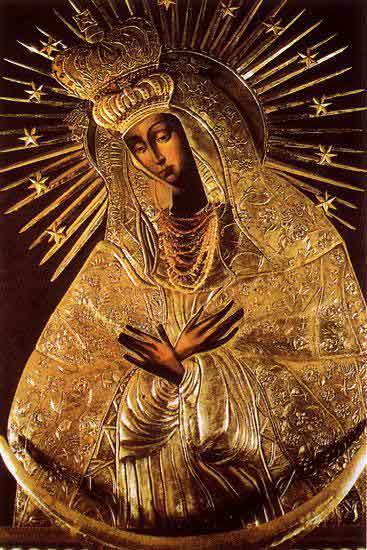Mother of those who place their hope in Solidarity, pray for us.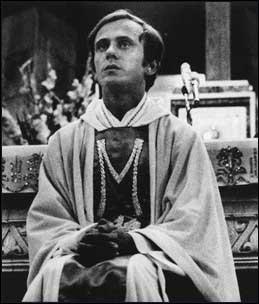
Mother of those who are deceived, pray for us.
Mother of those who are betrayed, pray for us.
Mother of those who are arrested in the night, pray for us.
Mother of those who are imprisoned, pray for us.
Mother of those who suffer from the cold, pray for us.
Mother of those who have been frightened, pray for us.
Mother of those who were subjected to interrogations, pray for us.
Mother of those innocents who have been condemned, pray for us.
Mother of those who speak the truth, pray for us.
Mother of those who cannot be corrupted, pray for us.
Mother of those who resist, pray for us.
Mother of orphans, pray for us.
Mother of those who have been molested because they wore your image, pray for us.
Mother of those who are forced to sign declarations contrary to their conscience, pray for us.
Mother of mothers who weep, pray for us.
Mother of fathers who have been so deeply saddened, pray for us.
Mother of our suffering country _____, pray for us.
Mother of our faithful country _____, pray for us.
We beg you, O mother in whom resides the hope of millions of people, grant us to live in liberty and in truth, in fidelity to you and to your Son. Amen.
Tags: blessed mother, blessed virgin mary, catholic, catholic podcast, catholic prayer, cathollc spirituality, hope, liberty, mother, prayer, suffering, truth
This entry was posted on Wednesday, October 19th, 2011 at 6:00 am
You can follow any responses to this entry through the RSS 2.0 feed.
Episode 1 -Listening For Truth – Introduction.  Making moral judgments.  What are the boundaries?  Giving God time to reach us.  Knowing how we are being guided properly.
– Introduction.  Making moral judgments.  What are the boundaries?  Giving God time to reach us.  Knowing how we are being guided properly.
[powerpress]
Deacon James Keating, PhD, the director of Theological Formation for the Institute for Priestly Formation, located at Creighton University, in Omaha, is making available to â€Discerning Hearts†and all who listen, his series of programs entitled “Listening For Truthâ€.
 Listening for Truth leads men and women in a search for a fuller experience of God that begins in prayer, grows in the rediscovery of our spiritual being, and grounds itself in the truth of Jesus Christ. A presentation of the Christian life as an engagement of the whole person — body, mind, and soul — in the challenge of daily living.
Listening for Truth leads men and women in a search for a fuller experience of God that begins in prayer, grows in the rediscovery of our spiritual being, and grounds itself in the truth of Jesus Christ. A presentation of the Christian life as an engagement of the whole person — body, mind, and soul — in the challenge of daily living.
For more information on the “Institute of Priestly Formation†and for other material available by Deacon Keating, just click here
Don’t forget to pickup a copy of “Communion with Christ†, it is one of the best audio sets on prayer…ever!
Check out Deacon Keating’s “Discerning Heart†page
Tags: catholic, catholic podcast, catholic prayer, cathollc spirituality, creighton university, Deacon James Keating, Deacon Keating, discerning heart, institute for priestly formation, james keating, prayer, theological formation, truth
This entry was posted on Thursday, May 12th, 2011 at 11:47 pm
You can follow any responses to this entry through the RSS 2.0 feed.
Episode 4 – Regnum Novum: Bringing forth the New Evangelization through Catholic Social Teaching with Omar Guiterrez – Value 4 Truth, Freedom, Justice, and Love part 1 “Truth and Freedom”
– Value 4 Truth, Freedom, Justice, and Love part 1 “Truth and Freedom”
Discerning Hearts is blessed to present Omar F. A. Guiterrez, M.A. , Special Assistant to Archbishop George Lucas of the Archdiocese of Omaha, in a groundbreaking series which breaks open the heart of Catholic Social Doctrine.
We encourage you to visit “Regnum Novum – A New Kingdom: A Revolution” Omar Guiterrez’s blog site
 We live at a very special time. The confluence of many things has brought forth the clear need to be able to articulate the Social Teaching of the Catholic Church in a way that is accessible and applicable. This is not to be an effort where high-minded theories are to be bandied about. Rather, this is a time of opportunity wherein we can apply the Social Doctrine to the concrete so as to bring about a New Kingdom, a Revolution. – Omar G. from Regnum Novum
We live at a very special time. The confluence of many things has brought forth the clear need to be able to articulate the Social Teaching of the Catholic Church in a way that is accessible and applicable. This is not to be an effort where high-minded theories are to be bandied about. Rather, this is a time of opportunity wherein we can apply the Social Doctrine to the concrete so as to bring about a New Kingdom, a Revolution. – Omar G. from Regnum Novum
[powerpress]
From episode … 4. Truth, Freedom, Justice, and Love part 1 “Truth and Freedom”
These are the four values of the Social Teaching of the Catholic Church as they’re enumerated in the Compendium and as they were laid out by, again, Blessed Pope John XXIII in Mater et magistra and Pacem in terris. Without these values, the work of social justice becomes an albatross around our necks. It pulls us down, threatening to poison all the work we do, no matter how well intentioned.
When charity lacks truth, as Pope Benedict XVI states, it can be filled with every whim and agenda and becomes the opposite of itself. Truth is the truth of the fundamental dignity of the human person, a dignity we can only fully appreciate in the encounter with Christ.
A freedom that requires self-destruction is no freedom at all. Authentic freedom is the ability to do what is good, but this requires that we know the truth about the good.
(Justice and Love covered in proceeding episodes)
Also visit Omar’s “Discerning Hearts” page Catholic Social Teaching 101
Tags: catholic, catholic podcast, catholic prayer, catholic social doctrine, cathollc spirituality, dignity of the human person, freedom, pope benedict xvi, pope john xxiii, social teaching of the catholic church, truth
This entry was posted on Wednesday, December 29th, 2010 at 7:00 am
You can follow any responses to this entry through the RSS 2.0 feed.
Talk 2 - Love has Expelled All Fear From My Heart
[powerpress]
The Truth Will Set You Free is a series of talks Deacon James Keating gave at a day of reflection at Kenrick-Glennon Seminary in November 2010. Deacon Keating is the Director of Theological Formation for the  Institute for Priestly Formation at Creighton University.
Click here for more Deacon Keating
Tags: catholic, catholic podcast, catholic prayer, cathollc spirituality, creighton university, deacon, Deacon James Keating, Deacon Keating, heart, institute for priestly formation, james keating, kenrick glennon seminary, love, The Truth Will Set You Free, theological formation, truth
This entry was posted on Monday, November 29th, 2010 at 12:16 am
You can follow any responses to this entry through the RSS 2.0 feed.
Talk 1 – Our Fear of Truth
[powerpress]
The Truth Will Set You Free is a series of talks Deacon James Keating gave at a day of reflection at Kenrick-Glennon Seminary in November 2010. Deacon Keating is the Director of Theological Formation for the  Institute for Priestly Formation at Creighton University.
Check at more Deacon Keating
Tags: catholic, catholic podcast, catholic prayer, cathollc spirituality, deacon, Deacon James Keating, Deacon Keating, fear, institute for priestly formation, james keating, kenrick glennon seminary, The Truth Will Set You Free, theological formation, truth
This entry was posted on Sunday, November 28th, 2010 at 9:17 am
You can follow any responses to this entry through the RSS 2.0 feed.
Episode 1 – Regnum Novum: Bringing forth the New Evangelization through Catholic Social Teaching with Omar Guiterrez – Introduction and Value # 1 – Jesus Christ
– Introduction and Value # 1 – Jesus Christ
Discerning Hearts is blessed to present Omar F. A. Guiterrez, M.A. , Special Assistant  to Archbishop George Lucas of the Archdiocese of Omaha, in a groundbreaking series which breaks open the heart of Catholic Social Doctrine.
[powerpress]
We encourage you to visit “Regnum Novum – A New Kingdom: AÂ Revolution” Omar Guiterrez’s blog site
 We live at a very special time. The confluence of many things has brought forth the clear need to be able to articulate the Social Teaching of the Catholic Church in a way that is accessible and applicable. This is not to be an effort where high-minded theories are to be bandied about. Rather, this is a time of opportunity wherein we can apply the Social Doctrine to the concrete so as to bring about a New Kingdom, a Revolution. – Omar G. from Regnum Novum
We live at a very special time. The confluence of many things has brought forth the clear need to be able to articulate the Social Teaching of the Catholic Church in a way that is accessible and applicable. This is not to be an effort where high-minded theories are to be bandied about. Rather, this is a time of opportunity wherein we can apply the Social Doctrine to the concrete so as to bring about a New Kingdom, a Revolution. – Omar G. from Regnum Novum
From episode … 1.     Jesus Christ
You may not believe how many advocates of social justice are only too ready to chuck Jesus out the window in order to get you to buy their plan. One such program of which I’m familiar actually includes materials that deny the divinity of Christ, several times, and deny the salvific work of the cross. As Pope Paul VI and Pope Benedict XVI have said, the Social Doctrine is evangelization. If it is not rooted in the truth, then it can be manipulated to mean whatever one wants it to mean. The truth is quite simply, Jesus Christ who, as Gaudium et spes states, reveals man to himself. The Social Doctrine and the work of charity must stem from an intimate knowledge of Jesus Christ so that they might serve the whole person and point back to Christ.
Also visit Omar’s “Discerning Hearts” page Catholic Social Teaching 101
Tags: catholic, catholic podcast, catholic prayer, catholic social doctrine, catholic social justice, catholic social teaching, cathollc spirituality, jesus christ, new evangelization, Omar Guiterrez, social doctrine, truth, work
This entry was posted on Friday, November 12th, 2010 at 4:39 pm
You can follow any responses to this entry through the RSS 2.0 feed.
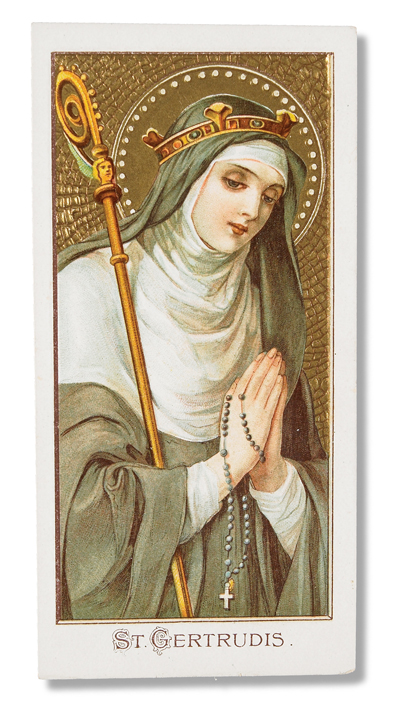
BENEDICT XVI GENERAL AUDIENCE (the entire text translated in English) from vatican.va
Dear Brothers and Sisters,
St Gertrude the Great, of whom I would like to talk to you today, brings us once again this week to the Monastery of Helfta, where several of the Latin-German masterpieces of religious literature were written by women. Gertrude belonged to this world. She is one of the most famous mystics, the only German woman to be called “Great”, because of her cultural and evangelical stature: her life and her thought had a unique impact on Christian spirituality. She was an exceptional woman, endowed with special natural talents and extraordinary gifts of grace, the most profound humility and ardent zeal for her neighbour’s salvation. She was in close communion with God both in contemplation and in her readiness to go to the help of those in need.
At Helfta, she measured herself systematically, so to speak, with her teacher, Matilda of Hackeborn, of whom I spoke at last Wednesday’s Audience. Gertrude came into contact with Matilda of Magdeburg, another medieval mystic and grew up under the wing of Abbess Gertrude, motherly, gentle and demanding. From these three sisters she drew precious experience and wisdom; she worked them into a synthesis of her own, continuing on her religious journey with boundless trust in the Lord. Gertrude expressed the riches of her spirituality not only in her monastic world, but also and above all in the biblical, liturgical, Patristic and Benedictine contexts, with a highly personal hallmark and great skill in communicating.
Gertrude was born on 6 January 1256, on the Feast of the Epiphany, but nothing is known of her parents nor of the place of her birth. Gertrude wrote that the L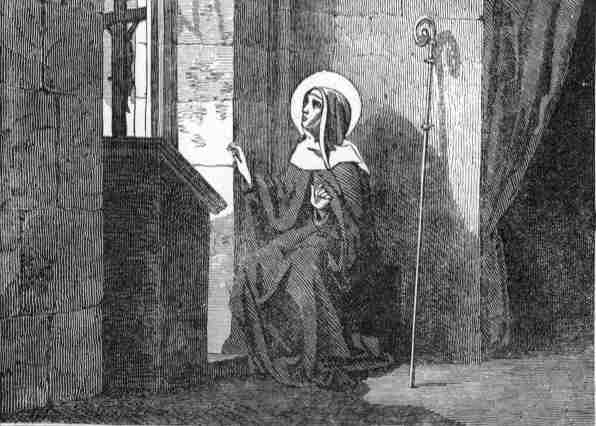 ord himself revealed to her the meaning of this first uprooting: “I have chosen you for my abode because I am pleased that all that is lovable in you is my work…. For this very reason I have distanced you from all your relatives, so that no one may love you for reasons of kinship and that I may be the sole cause of the affection you receive” (The Revelations, I, 16, Siena 1994, pp. 76-77).
ord himself revealed to her the meaning of this first uprooting: “I have chosen you for my abode because I am pleased that all that is lovable in you is my work…. For this very reason I have distanced you from all your relatives, so that no one may love you for reasons of kinship and that I may be the sole cause of the affection you receive” (The Revelations, I, 16, Siena 1994, pp. 76-77).
When she was five years old, in 1261, she entered the monastery for formation and education, a common practice in that period. Here she spent her whole life, the most important stages of which she herself points out. In her memoirs she recalls that the Lord equipped her in advance with forbearing patience and infinite mercy, forgetting the years of her childhood, adolescence and youth, which she spent, she wrote, “in such mental blindness that I would have been capable… of thinking, saying or doing without remorse everything I liked and wherever I could, had you not armed me in advance, with an inherent horror of evil and a natural inclination for good and with the external vigilance of others. “I would have behaved like a pagan… in spite of desiring you since childhood, that is since my fifth year of age, when I went to live in the Benedictine shrine of religion to be educated among your most devout friends” (ibid., II, 23, p. 140f.).
Gertrude was an extraordinary student, she learned everything that can be learned of the sciences of the trivium and quadrivium, the education of that time; she was fascinated by knowledge and threw herself into profane studies with zeal and tenacity, achieving scholastic successes beyond every expectation. If we know nothing of her origins, she herself tells us about her youthful passions: literature, music and song and the art of miniature painting captivated her. She had a strong, 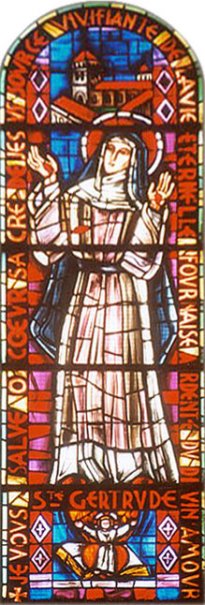 determined, ready and impulsive temperament. She often says that she was negligent; she recognizes her shortcomings and humbly asks forgiveness for them. She also humbly asks for advice and prayers for her conversion. Some features of her temperament and faults were to accompany her to the end of her life, so as to amaze certain people who wondered why the Lord had favoured her with such a special love.
determined, ready and impulsive temperament. She often says that she was negligent; she recognizes her shortcomings and humbly asks forgiveness for them. She also humbly asks for advice and prayers for her conversion. Some features of her temperament and faults were to accompany her to the end of her life, so as to amaze certain people who wondered why the Lord had favoured her with such a special love.
From being a student she moved on to dedicate herself totally to God in monastic life, and for 20 years nothing exceptional occurred: study and prayer were her main activities. Because of her gifts she shone out among the sisters; she was tenacious in consolidating her culture in various fields.
Nevertheless during Advent of 1280 she began to feel disgusted with all this and realized the vanity of it all. On 27 January 1281, a few days before the Feast of the Purification of the Virgin, towards the hour of Compline in the evening, the Lord with his illumination dispelled her deep anxiety. With gentle sweetness he calmed the distress that anguished her, a torment that Gertrude saw even as a gift of God, “to pull down that tower of vanity and curiosity which, although I had both the name and habit of a nun alas I had continued to build with my pride, so that at least in this manner I might find the way for you to show me your salvation” (ibid., II, p. 87). She had a vision of a young man who, in order to guide her through the tangle of thorns that surrounded her soul, took her by the hand. In that hand Gertrude recognized “the precious traces of the wounds that abrogated all the acts of accusation of our enemies” (ibid., II, 1, p. 89), and thus recognized the One who saved us with his Blood on the Cross: Jesus.
From that moment her life of intimate communion with the Lord was intensified, especially in the most important liturgical seasons Advent-Christmas, Lent-Easter, the feasts of Our Lady even when illness prevented her from going to the choir. This was the same liturgical humus as that of Matilda, her teacher; but Gertrude describes it with simpler, more linear images, symbols and terms that are more realistic and her references to the Bible, to the Fathers and to the Benedictine world are more direct.
Her biographer points out two directions of what we might describe as her own particular “conversion“: in study, with the radical passage from profane, humanistic studies to the study of theology, and in monastic observance, with the passage from a life that she describes as negligent, to the life of intense, mystical prayer, with exceptional missionary zeal. The Lord who had chosen her from her mother’s womb and who since her childhood had made her partake of the banquet of monastic life, called her again with his grace “from external things to inner life and from earthly occupations to love for spiritual things”. Gertrude understood that she was remote from him, in the region of unlikeness, as she said with Augustine; that she had dedicated herself with excessive greed to liberal studies, to human wisdom, overlooking spiritual knowledge, depriving herself of the taste for true wisdom; she was then led to the mountain of contemplation where she cast off her former self to be reclothed in the new. “From a grammarian she became a theologian, with the unflagging and attentive reading of all the sacred books that she could lay her hands on or contrive to obtain. She filled her heart with the most useful and sweet sayings of Sacred Scripture. Thus she was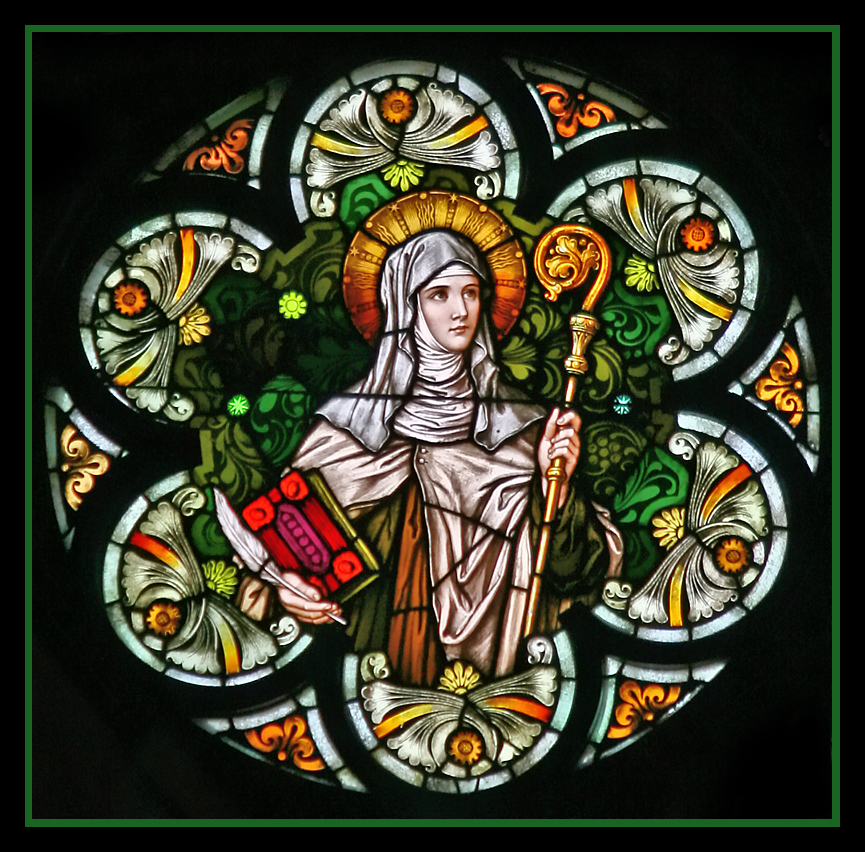 always ready with some inspired and edifying word to satisfy those who came to consult her while having at her fingertips the most suitable scriptural texts to refute any erroneous opinion and silence her opponents” (ibid., I, 1, p. 25).
always ready with some inspired and edifying word to satisfy those who came to consult her while having at her fingertips the most suitable scriptural texts to refute any erroneous opinion and silence her opponents” (ibid., I, 1, p. 25).
Gertrude transformed all this into an apostolate: she devoted herself to writing and popularizing the truth of faith with clarity and simplicity, with grace and persuasion, serving the Church faithfully and lovingly so as to be helpful to and appreciated by theologians and devout people.
Little of her intense activity has come down to us, partly because of the events that led to the destruction of the Monastery of Helfta. In addition to The Herald of Divine Love and The Revelations, we still have her Spiritual Exercises, a rare jewel of mystical spiritual literature.
In religious observance our Saint was “a firm pillar… a very powerful champion of justice and truth” (ibid., I, 1, p. 26), her biographer says. By her words and example she kindled great fervour in other people. She added to the prayers and penances of the monastic rule others with such devotion and such trusting abandonment in God that she inspired in those who met her an awareness of being in the Lord’s presence. In fact, God made her understand that he had called her to be an instrument of his grace. Gertrude herself felt unworthy of this immense divine treasure, and confesses that she had not safeguarded it or made enough of it. She exclaimed: “Alas! If you had given me to remember you, unworthy as I am, by even only a straw, I would have viewed it with greater respect and reverence that I have had for all your gifts!” (ibid., II, 5, p. 100). Yet, in recognizing her poverty and worthlessness she adhered to God’s will, “because”, she said, “I have so little profited from your graces that I cannot resolve to believe that they were lavished upon me solely for my own use, since no one can thwart your eternal wisdom. Therefore, O Giver of every good thing who has freely lavished upon me gifts so undeserved, in order that, in reading this, the heart of at least one of your friends may be moved at the thought that zeal for souls has induced you to leave such a priceless gem for so long in the abominable mud of my heart” (ibid., II, 5, p. 100f.).
Two favours in particular were dearer to her than any other, as Gertrude herself writes: “The stigmata of your salvation-bearing wounds which you impressed upon me, as it were, like a valuable necklaces, in my heart, and the profound and salutary wound of love with which you marked it. “You flooded me with your gifts, of such beatitude that even were I to live for 1,000 years with no consolation neither interior nor exterior the memory of them would suffice to comfort me, to enlighten me, to fill me with gratitude. 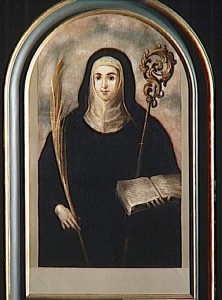 Further, you wished to introduce me into the inestimable intimacy of your friendship by opening to me in various ways that most noble sacrarium of your Divine Being which is your Divine Heart…. To this accumulation of benefits you added that of giving me as Advocate the Most Holy Virgin Mary, your Mother, and often recommended me to her affection, just as the most faithful of bridegrooms would recommend his beloved bride to his own mother” (ibid., II, 23, p. 145).
Further, you wished to introduce me into the inestimable intimacy of your friendship by opening to me in various ways that most noble sacrarium of your Divine Being which is your Divine Heart…. To this accumulation of benefits you added that of giving me as Advocate the Most Holy Virgin Mary, your Mother, and often recommended me to her affection, just as the most faithful of bridegrooms would recommend his beloved bride to his own mother” (ibid., II, 23, p. 145).
Looking forward to never-ending communion, she ended her earthly life on 17 November 1301 or 1302, at the age of about 46. In the seventh Exercise, that of preparation for death, St Gertrude wrote: “O Jesus, you who are immensely dear to me, be with me always, so that my heart may stay with you and that your love may endure with me with no possibility of division; and bless my passing, so that my spirit, freed from the bonds of the flesh, may immediately find rest in you. Amen” (Spiritual Exercises, Milan 2006, p. 148).
It seems obvious to me that these are not only things of the past, of history; rather St Gertrude’s life lives on as a lesson of Christian life, of an upright path, and shows us that the heart of a happy life, of a true life, is friendship with the Lord Jesus. And this friendship is learned in love for Sacred Scripture, in love for the Liturgy, in profound faith, in love for Mary, so as to be ever more truly acquainted with God himself and hence with true happiness, which is the goal of our life. Many thanks.
Tags: benedict xvi, catholic, catholic podcast, catholic prayer, cathollc spirituality, contemplation, famous mystics, heart, love, mystic, mystic of the Church, mystical experiences, sacred scripture, st gertrude, truth, women of the middle ages
This entry was posted on Wednesday, October 6th, 2010 at 6:47 pm
You can follow any responses to this entry through the RSS 2.0 feed.

